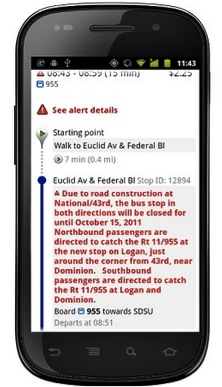Martin Kelly Jones makes his living suing transit agencies and other entities for violating his patents on real-time tracking technology. His lawsuits have been an expensive nuisance for the companies and agencies he sues, usually settling for $50,000 to $75,000. But a movement to stop him is gaining traction.

The Electronic Frontier Foundation, in its quest to invalidate patents that hinder innovation, has been looking for what's called "prior art." Prior art is evidence that an idea existed and was in circulation before someone else patented it. EFF thinks they've found it.
Last week, EFF and attorneys at Berkeley Law School filed a request with the United States Patent and Trademark Office, urging the office to re-examine the legitimacy of Jones' patent on real-time tracking technology.
"Even if you could patent something that broad and vague – and we think you can't – you certainly can't patent something that was invented by other people years before," said EFF Staff Attorney Julie Samuels.
EFF says they've got their "prior art":
ArrivalStar [one of Jones' offshore companies] claims its patents are based on an invention from 1999 and argues that many widely used transit-tracking systems – as well as some package-tracking services used by delivery and shipping companies – are infringing. But in the reexamination request filed today, EFF and the Samuelson Clinic show that as far back as 1992, public technical reports described a "Smart Bus system" that used the same methods as those included in the ArrivalStar patent.
EFF found a U.S. DOT technical report from 1992 that describes just the kind of vehicle tracking in the patent, according to details provided by David Alpert at Greater Greater Washington. "News articles talk about the Nextbus company's product, which also does this, from 1996. Yet the patent office granted Patent #7,030,781 in 1999 2006, but with a 'priority date,' the date before which prior art is relevant, of 1999 or 1993."
Patent trolls -- people who don't make or sell anything but hold on to patents so they can sue anyone that does -- put a chill on innovation. In this case, they disincentivize transit agencies from providing information that makes their service far more appealing and easy to use. We all pay the price of low transit ridership in the form of traffic congestion, safety hazards, air pollution, and decreased mobility. EFF, Berkeley, and all the other advocates and attorneys working to stop patent trolling are doing us all a favor.





